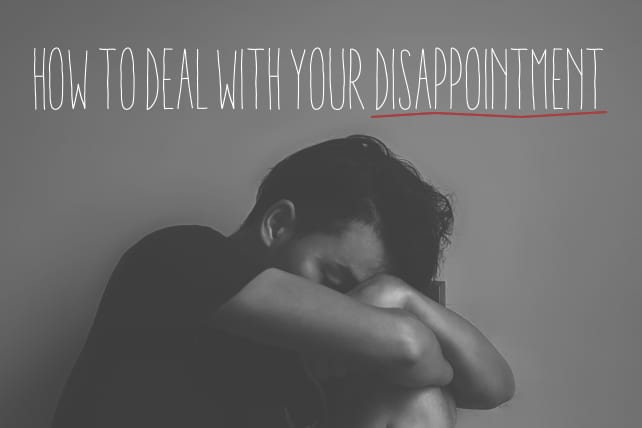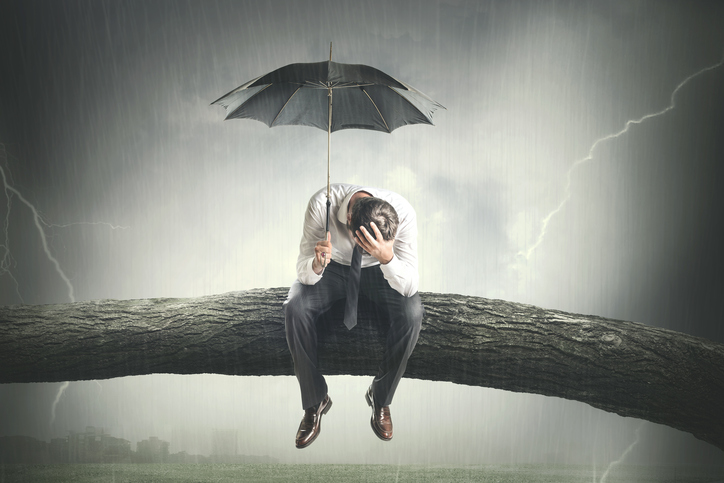

Wrestling With Frustration: How to Cope When You're Disappointed in Yourself
There’s a unique kind of ache that surfaces when the person you’ve let down… is you. While many of us fear disappointing loved ones, bosses, or friends, there's a deeper discomfort that comes from falling short of your own expectations.
It hits differently. It stirs a strange mix of regret, self-doubt, and even shame—like standing on the edge of a high dive and realizing too late you don't want to jump, or tasting that old sushi you knew you should’ve tossed.
Why does this hit so hard? Perhaps it’s because you alone are aware of your full potential—so when you miss your mark, you don’t just fail at a task, you feel like you’ve failed yourself. And the worst part? You're the only one who can make peace with it.
But here’s the truth: there is a powerful antidote to this emotional spiral. It’s not denial, and it’s not perfectionism—it’s self-compassion.
According to research cited in The Washington Post, individuals who practice self-compassion tend to recover faster from stress. They bounce back more smoothly from arguments, traffic jams, job rejections, or any number of emotional landmines. They also spend less time trapped in the loop of rumination.

7 Uplifting Ways to Reclaim Your Confidence After Letting Yourself Down
1. Let the Truth Sink In—Then Face It
Disappointment has stages, and the first is acknowledgment. Not denial, not sugar-coating. Just a quiet reckoning with what went wrong. This isn't self-punishment—it's step one in reclaiming clarity.
If you need to cry, cry. If you need to feel sorry for yourself for a bit, give yourself that space. But after that? Sit down and name the misstep. Literally say it aloud:
“I feel disappointed because I didn’t achieve what I set out to do.”
It’s a small phrase, but it can shift your mindset from chaos to clarity. It transforms vague shame into something specific, something manageable—and something you can learn from.
2. Be the Friend You’d Want in This Moment
It's tempting to scold yourself during times like this, but ask yourself: would you say those same harsh words to a close friend in the same situation?
Probably not. You’d listen, comfort them, remind them of their strengths. That’s the exact approach you need to give yourself now.
It’s easy to become your own worst critic, but this is when you need to become your own ally instead. Treating yourself with grace doesn’t let you off the hook—it lets you heal and reflect without adding extra damage.

3. Check Your Expectations at the Door
Disappointment is often a byproduct of unrealistic—or poorly timed—expectations.
Think back to your younger self making bold declarations:
“I’m going to win the talent show.”
“I’ll sell the most cookies this year.”
“First place is mine in that race.”
Ambition is wonderful. Dreaming big is healthy. But disappointment often arises not from the goal itself, but from setting it without truly assessing readiness.
Ask yourself: were your expectations fair, based on your current preparation, energy, or time? If not, it’s no wonder the fall stung.
This isn’t about lowering your standards—it’s about aligning your goals with your current reality.
4. Healthy Distractions Aren’t Escapes—They’re Lifelines
When you're in the throes of disappointment, there's a strong urge to unplug from the world—sometimes through Netflix marathons, junk food, or mindless scrolling.
A little bit of that is okay. But instead of numbing the ache, why not use distraction as a reset button?
Take yourself somewhere stimulating. Crack open that long-ignored novel. Call an old friend and chat about anything but the issue. Visit a park, sketch, bake, go dancing—whatever shakes the tension loose.
These kinds of diversions don’t suppress your feelings. They remind you that there's life beyond this one moment.

5. Ask the Questions That Actually Help
Once the emotional wave has passed, it's time for inquiry—not interrogation, but honest exploration.
Think through questions like:
-
Did I allow myself enough time to prepare?
-
Did I seek the support I needed?
-
Were my boundaries too loose or unclear?
-
Did I plan realistically, or just hope for the best?
These aren’t questions to shame you—they’re tools to unearth blind spots. The answers will illuminate what went wrong, and more importantly, how to adjust.
6. Make Adjustments, Not Just Promises
We’ve all said it: “I’ll do better next time.” But vague intentions often lead to repeated mistakes.
Instead, tie your lessons to a real, upcoming opportunity. What’s on your calendar? What deadlines, events, or projects lie ahead?
Use what you learned to shape a better strategy. Maybe it’s setting milestones, building in rest days, or asking for feedback early. The goal isn’t just redemption—it’s evolution.
7. Let the Disappointment Point You in the Right Direction
This last one may surprise you: the depth of your disappointment is actually a signal.
It means you care. It means something mattered enough to you that not achieving it hurt. And that’s not a failure—it’s a compass.
Let that passion guide you. Let the pain highlight what’s meaningful to you. Because when you feel disappointed, you’re not broken—you’re motivated.

Letting Go: How to Process Disappointment and Find Emotional Grounding
Sometimes, it’s not a single missed goal that brings disappointment—it’s a larger, deeper event: a breakup, a lost opportunity, the death of a loved one, or even unspoken dreams that never materialized.
Understanding Where Your Pain Comes From
Not all disappointments are created equal. Some can be addressed with small shifts. Others require significant emotional processing.
For instance:
-
Didn’t get a job promotion? You might have to decide whether to stay or move on.
-
Lost a relationship? You may find yourself replaying events, stuck in "what ifs."
-
Grieving a loved one? That weight may sit with you, unresolved, for years if unacknowledged.
Each situation calls for different healing—yet all require honesty about how you feel.
Silence Doesn't Heal
A common coping strategy is pretending things are fine—burying your emotions under distraction or forced positivity. But ignoring disappointment doesn't erase it.
In fact, unresolved disappointment can impact your ability to trust, to connect, and to risk vulnerability again.
Suppressing emotions might feel like control—but it’s a trap. They don’t vanish. They just resurface later, often more intense than before.
Strategies to Help You Move Forward
Facing your disappointment doesn’t mean wallowing in it. It means making peace with it and choosing to move forward with clarity.
Here are a few grounded steps:
Recognize Your Emotions Honestly
Talk to yourself as you would to a friend. Admit when you're hurting. Speak your truth out loud or journal it. If you have someone you trust, share your thoughts—sometimes, simply being heard is incredibly healing.
Seek Outside Perspective
A professional therapist can help you unpack layers you didn’t even realize were weighing you down. It’s not about being broken—it’s about learning healthier tools to respond.
Look for Moments of Peace
You don’t need grand joy to start feeling better. Focus on small joys: a familiar song, a quiet walk, a conversation that brings laughter. These aren’t escapes—they’re reminders that pain isn’t all there is.
Write It Out, Fact-Check Your Feelings
Journaling helps separate what you feel from what is actually happening. What are the facts? What do they really say about you? Often, disappointment distorts reality. Writing helps you recalibrate.
Learn from What Happened
Sometimes disappointment teaches more than success ever could. Reflecting on what happened, what you could’ve done differently, and what you now know sets you up to face future challenges with new strength.
Don’t Dismiss the Good
Take inventory of the parts of yourself you don’t feel disappointed in. Your loyalty. Your persistence. Your kindness. Those qualities still exist, even in the middle of frustration.
Lean on Someone
Even the strongest people need someone to lean on. If it’s not a friend, seek out a support group, therapist, or coach. Human connection is one of the most effective antidotes to emotional stagnation.

Frequently Asked Questions (FAQs)
How does disappointment actually feel?
It often feels heavy, like a knot in your stomach or a fog over your mind. The sensation can mirror physical pain, and it's deeply uncomfortable, sometimes even frightening.
What triggers feelings of disappointment?
It usually stems from unmet expectations—whether those expectations were realistic or not. It can also be triggered by unforeseen life events that derail your plans.
What’s the best way to handle being disappointed?
Acknowledging the feeling is the first step. Give yourself time to process, talk about it, and when you're ready, start building coping strategies that help you move forward.
How do I recover after something really lets me down?
Recovery means allowing your emotions to be felt, then finding outlets to grow stronger—whether that’s therapy, writing, talking to someone, or taking new actions aligned with your values.
Is disappointment a single emotion or a mix?
Disappointment is usually a cocktail of emotions—sadness, fear, anger, and sometimes grief. It’s complex, and that’s why it needs to be understood, not rushed through.
Can you express disappointment without being angry?
Yes. It’s okay to say, “I’m really disappointed,” calmly. Expressing that vulnerability can be more effective than lashing out, and it opens space for real conversation and healing.
How should I talk to someone who let me down?
Be honest but measured. A simple “I’m feeling hurt by this” can open the door without starting a fight. You don’t need to explain every detail—just speak from your truth.
How do I stop feeling constantly let down by others?
Accept that no one is perfect. Learning to manage expectations and developing healthy emotional boundaries can reduce that recurring disappointment.
Is disappointment the same as sadness?
They often overlap, but they’re not identical. Disappointment usually carries the weight of expectation—it’s sadness plus a sense that something should have been different.
How can I start healing?
Start by validating how you feel. Then remind yourself that this is one moment—not your whole life. Begin building small steps that bring you forward instead of keeping you stuck.
Is there anything good about disappointment?
Actually, yes. Disappointment signals that something matters to you. That spark of caring is powerful—it can fuel change, creativity, and clarity about what truly fulfills you.
Why does disappointment hit so hard?
Often, it’s rooted in expectation. We assume something should happen a certain way, and when it doesn’t, it feels like the world is out of order. Understanding that expectations aren’t guarantees helps soften that impact.
Is every disappointment secretly a blessing?
That depends on what you do with it. Disappointment can push you to reassess your values, make braver choices, or appreciate what you overlooked before. With reflection, it often becomes a turning point.
Is it worse to feel disappointed than angry?
Neither emotion is inherently worse—it depends on how you manage them. What’s harmful is staying stuck in either state. Processing and releasing both are key to your emotional growth.
Let disappointment be a message, not a verdict. It's not the end of your story—just a pause, a lesson, and maybe even a new beginning in disguise.
